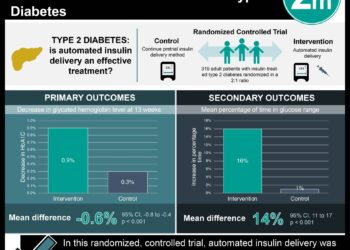Disparities in type 1 diabetes not explained by socioeconomic status alone
1. In this retrospective cohort study of pediatric patients with type 1 diabetes mellitus (T1DM), black children had less frequent use of insulin pumps, poorer glycemic control, and more diabetic complications (diabetic ketoacidosis and severe hypoglycemia) compared to white and Hispanic children, even after adjusting for socioeconomic status.
2. The differences in hemoglobin A1c and diabetic complications among Hispanic and white children were mediated by socioeconomic status.
Evidence Rating Level: 2 (Good)
Study Rundown: Racial and ethnic disparities exist in diabetes treatment and outcomes. However, it is not known whether these differences exist due to socioeconomic, genetic, physiologic, or provider-related factors. This study sought to examine the disparities among treatment and outcomes of T1DM in a large pediatric population. During the 2-year study period, white children were found to be more likely to have insulin pumps than black and Hispanic children, even after adjusting for socioeconomic status, age, gender, and diabetes duration. Black children had higher mean hemoglobin A1c scores, and experienced more complications of their diabetes, such as diabetic ketoacidosis and severe hypoglycemia, compared to white and Hispanic children. The differences in hemoglobin A1c scores and diabetic complications among white and Hispanic children were mediated by differences in socioeconomic status. This study is limited by lack of randomization or population-based participant selection, as well as an inability to assess for the impact of genetics, culture, and provider-patient communication. However, these findings may provide awareness among providers about the disparities that exist for black children with T1DM, despite socioeconomic status.
Click to read the study, published today in Pediatrics
Relevant Reading: Health inequity in children and youth with chronic health conditions.
In-Depth [retrospective cohort]: Participants included 10 704 pediatric patients aged <18 years with T1DM diagnosed for ≥1 year from the T1D Exchange Clinic Network. The mean age was 11.9 years and mean diabetes duration was 5.2 years. A majority of participants were white (83%), while 11% identified as Hispanic and 7% as black. After adjusting for gender, age, diabetes duration, and socioeconomic status, white children had a significantly higher percentage of insulin pump use (p < 0.001). White children were 3.6 times more likely to be using an insulin pump compared to black children, and 1.9 times more likely compared to Hispanic children (95% CI 2.9-4.7 and 1.6-2.2, respectively). The mean hemoglobin A1c score was significantly higher for black children (9.6%), compared to white (8.4%) and Hispanic (8.7%) children, even after adjusting for socioeconomic status. Black children had a 2.5 times higher risk of diabetic ketoacidosis in the past year compared to white children, and 2.0 times higher risk compared to Hispanic children (95% CI 2.0-3.2 and 1.5-2.6, respectively), after adjusting factors including socioeconomic status.
Image: CC
©2015 2 Minute Medicine, Inc. All rights reserved. No works may be reproduced without expressed written consent from 2 Minute Medicine, Inc. Inquire about licensing here. No article should be construed as medical advice and is not intended as such by the authors or by 2 Minute Medicine, Inc.







